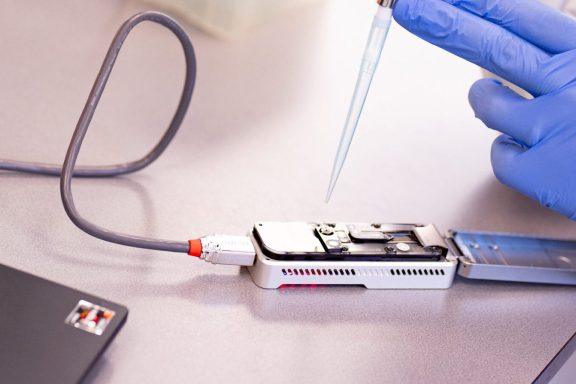
We are a bioinformatics lab that creates and applies innovative data science methods to advance our understanding of disease biology and molecular medicine with a focus on cancer research.
To achieve this, we build on the latest developments in machine learning and artificial intelligence and aim to adopt advances in these fields to achieve omics data analysis and data integration strategies. We therefore also heavily rely on high-performance computing and statistics.
For general inquiries, please contact Jeroen de Ridder, Principal Investigator.
We specialize in developing advanced machine learning and artificial intelligence algorithms to achieve various critical (pre-)clinical objectives using modern omics data. For instance, with Sturgeon we’ve cut down drastically on the time required for (pediatric) CNS cancer diagnostics with intraoperative native DNA Nanopore sequencing and methylation classification using deep learning. This is a clear example of our constant quest for actual, clinical, bedside impact. To facilitate these results, we also focus on laying the necessary groundwork, such as by rigorously comparing the newest Nanopore base-calling models and studying colorectal cancer cell evolution at a single-cell level. Interest areas in the lab are broad and range from GWAS, to liquid biopsy classification under data sparsity, to 3D genome conformation and epigenetics. Additionally, we devised approaches to identify robust gene-sets or pathways that differentiate between breast cancer subtypes or cancer treatment. In this endeavor, we employ machine learning models that can exploit existing biological knowledge, such as network- and pathway-based classifiers. In all
these varied endeavors, translating from fundamental research to actual patient benefit is a guiding principle.
We create classification models for patient cohort and clinical trial data to improve diagnostics and enable personalization of treatment strategies. Our track record includes the development of classifiers which can predict treatment benefit in multiple myeloma and colorectal cancer. The aforementioned liquid biopsy-based cancer type classification in sparse data conditions is only our first foray into the exciting new world of cell-free DNA diagnostics, which holds the promise to greatly increase patient comfort while at the same time enabling precision diagnoses. For the development of new liquid biopsy diagnostic applications, we harness state-of-the-art sequencing technologies. Notably, in collaboration with the Kloosterman lab, we have introduced CyclomicsSeq, a groundbreaking method for profiling cell-free tumor DNA through nanopore sequencing, which forms the foundation of our spin-out company, Cyclomics BV. Moreover, we are actively engaged in various projects focused on detecting base modifications and harnessing them for applications in cancer diagnostics.
We actively participated in a wide array of collaborative projects. For instance, we partnered with the van Oudenaarden lab to investigate cell lineage tracing in colon cancer organoid models, contributing to a deeper understanding of tumor evolution. Additionally, in collaboration with the de Laat lab, we co-developed Multi-Contact 4C, an innovative chromatin conformation capture strategy capable of identifying complex multi-ray chromatin interactions using long-read sequencing. Currently, we are working together within an Oncode Accelerator consortium focused on ML applications for revolutionizing the development of cancer treatments, where we investigate the clinical translation of the wave of self-supervised foundation models.